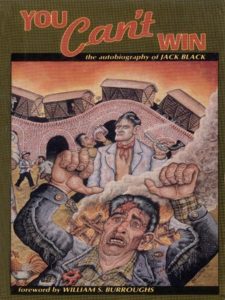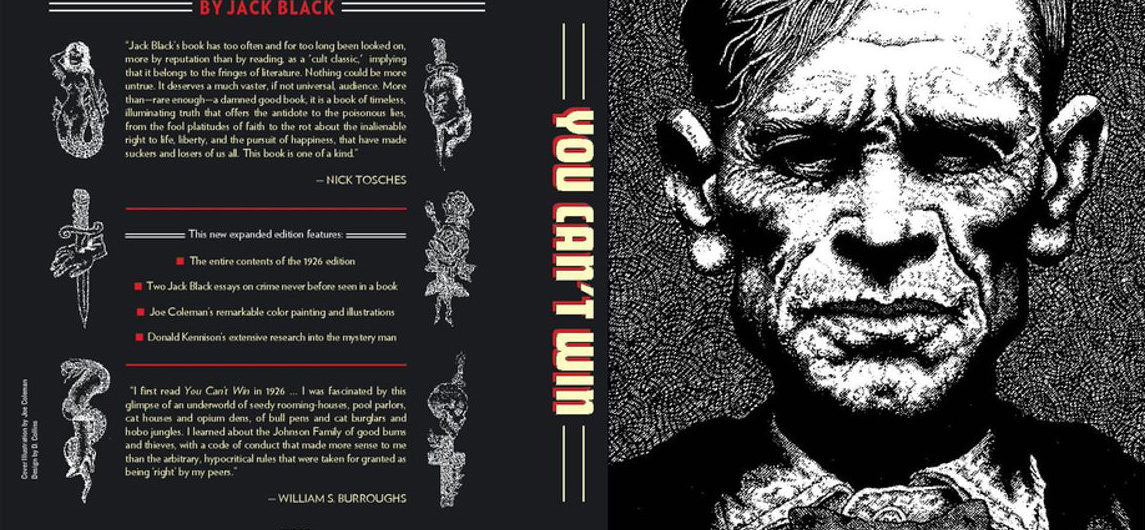You Can’t Win is known as William Burroughs‘ favorite book. A journey into the hobo underworld, freight hopping around the still Wild West, becoming a highwayman and member of the yegg (criminal) brotherhood, getting hooked on opium, doing stints in jail or escaping, often with the assistance of crooked cops or judges. The book also contains an introduction by Burroughs.
 My background is crowded with robberies, burglaries, and thefts too numerous to recall. All manner of crimes against property. Arrests, trials, acquittals, convictions, escapes. Penitentiaries! I see in the background four of them. County jails, workhouses, city prisons, Mounted Police barracks, dungeons, solitary confinement, bread and water, hanging up, brutal floggings, and the murderous straitjacket. I see hop joints, wine dumps, thieves’ resorts, and beggars’ hangouts. Crime followed by swift retribution in one form or another. I had very few glasses of wine as I traveled this route. I rarely saw a woman smile and seldom heard a song. In those twenty-five years I took all these things, and I am going to write about them. And I am going to write about them as I took them – with a smile.
My background is crowded with robberies, burglaries, and thefts too numerous to recall. All manner of crimes against property. Arrests, trials, acquittals, convictions, escapes. Penitentiaries! I see in the background four of them. County jails, workhouses, city prisons, Mounted Police barracks, dungeons, solitary confinement, bread and water, hanging up, brutal floggings, and the murderous straitjacket. I see hop joints, wine dumps, thieves’ resorts, and beggars’ hangouts. Crime followed by swift retribution in one form or another. I had very few glasses of wine as I traveled this route. I rarely saw a woman smile and seldom heard a song. In those twenty-five years I took all these things, and I am going to write about them. And I am going to write about them as I took them – with a smile.
 The book tells of Black’s experiences in the hobo underworld, freight-hopping around the western United States and Canada, with the majority of incidents taking place from the late 1880s to around 1910. He tells of becoming a thief, burglar, and member of the yegg (safe-cracking) subculture, exploring the topics of crime, criminal justice, vice, addictions, penology, and human folly from various viewpoints, from observer to consumer to supplier, and from victim to perpetrator.
The book tells of Black’s experiences in the hobo underworld, freight-hopping around the western United States and Canada, with the majority of incidents taking place from the late 1880s to around 1910. He tells of becoming a thief, burglar, and member of the yegg (safe-cracking) subculture, exploring the topics of crime, criminal justice, vice, addictions, penology, and human folly from various viewpoints, from observer to consumer to supplier, and from victim to perpetrator.
 The main criminal activity of Black’s life and of the book is thievery, which leads to discussions of various technical aspects of the thief’s “trade”, including casing of prospects (surveillance of targets), safe-cracking, fencing of stolen goods, the disposal of evidence, maintaining aliases and avoiding attention or traceability, the social networks of criminals, the experiences of being arrested, questioned, and tried, and the experience of doing time in jails and prisons.
The main criminal activity of Black’s life and of the book is thievery, which leads to discussions of various technical aspects of the thief’s “trade”, including casing of prospects (surveillance of targets), safe-cracking, fencing of stolen goods, the disposal of evidence, maintaining aliases and avoiding attention or traceability, the social networks of criminals, the experiences of being arrested, questioned, and tried, and the experience of doing time in jails and prisons.
The vices and addictions Black discusses include alcoholism, abuse of opium (hop), gambling, prostitution, and stealing. In his own telling, Black does not seem to have an especial weakness for addictions (for example, he did not become alcoholic himself), but he does describe the addictive allure that gambling and opium held for him in various stages of his life. He expresses an opinion that drug addiction is more psychological than physical; nevertheless, he also admits that breaking himself of a daily opium habit was the toughest battle of his life.
The book has been adapted to a film titled You Can’t Win (scheduled to be released in 2019) starring Julia Garner, Jeremy Allen White and Michael Pitt, who co-produced and co-wrote the screenplay.





